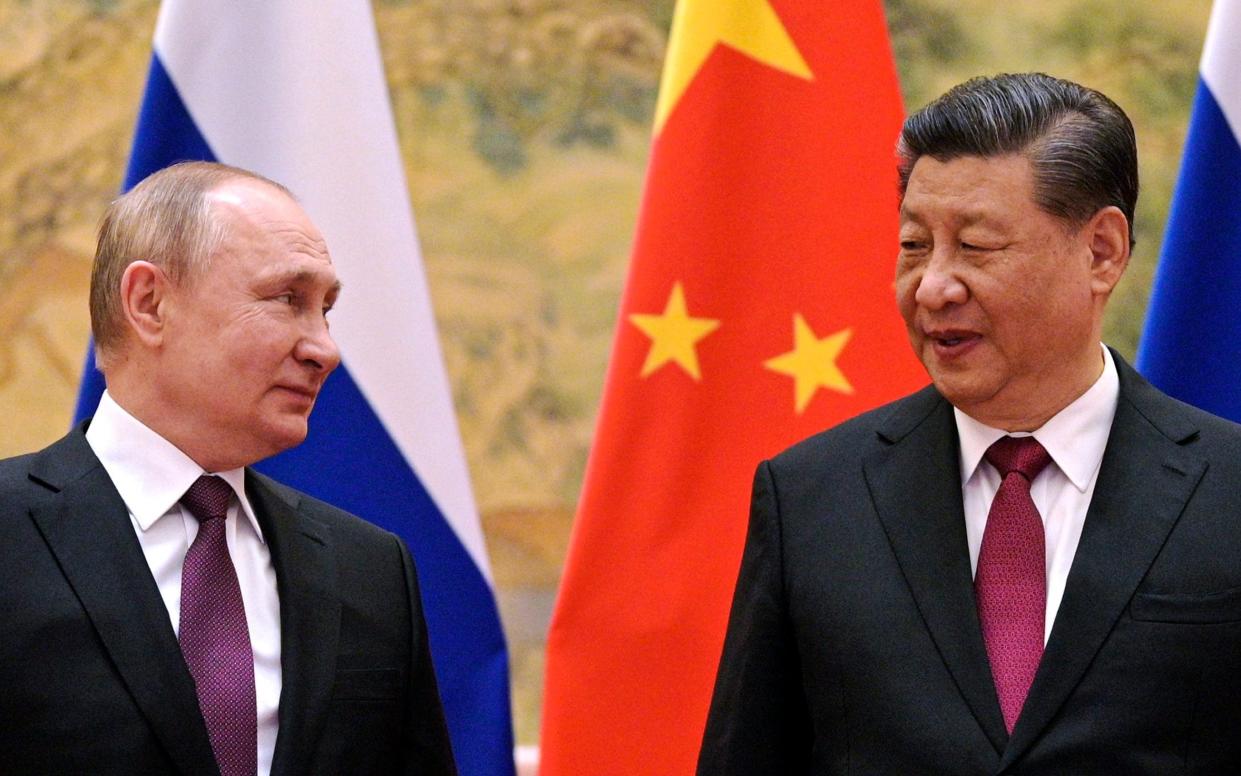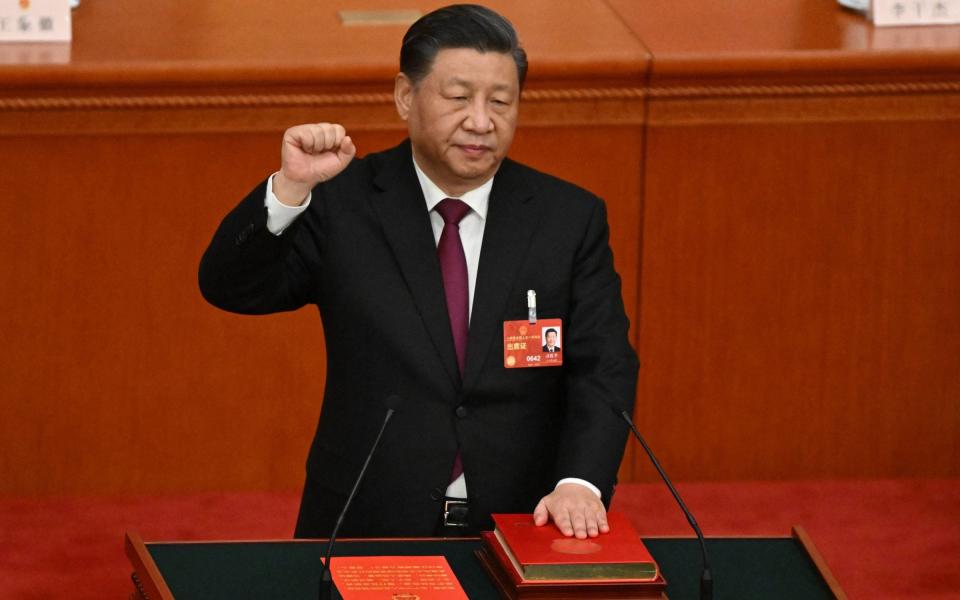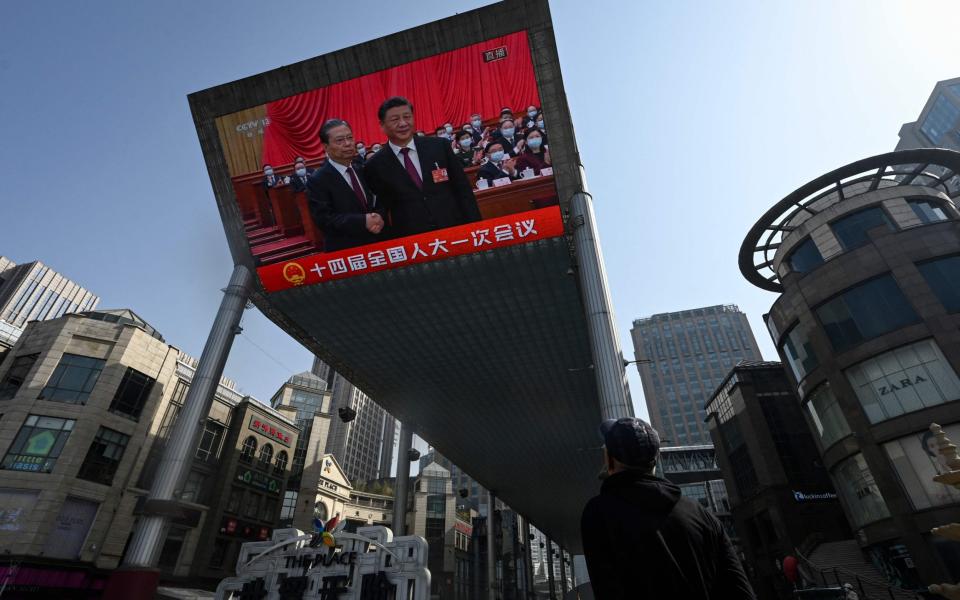Putin congratulates ‘dear friend’ Xi on winning new term by 2,952 votes to 0

- Oops!Something went wrong.Please try again later.
- Oops!Something went wrong.Please try again later.
Vladimir Putin congratulated Xi Jinping on his third term as China’s leader, hailing the strengthening ties between the two countries.
In a statement released by the Kremlin, the Russian president: “Dear friend, please accept sincere congratulations. Russia highly values your personal contribution toward the strengthening of ties... and strategic co-operation between our nations.”
Delegates handed Mr Xi a third term as China’s president and re-elected him as head of the country’s Central Military Commission in a unanimous vote.
The appointment came after he locked in another five years as head of the Chinese Communist Party last October.
Since then, the 69-year-old has weathered widespread protests over his zero-Covid policy and the deaths of countless people after its abandonment.

Those issues have been avoided at this week’s National People’s Congress, a carefully choreographed event that was also set to appoint Li Qiang, an ally of Mr Xi, as the new premier.
Beijing’s Great Hall of the People was adorned with crimson carpets and banners for the landmark vote, with a military band providing background music.
A digital monitor on the edge of the stage proclaimed the final tally – all 2,952 votes had been cast in favour of awarding Mr Xi another term in office.
The announcement was followed by fervent declarations of allegiance by delegates to the Chinese constitution in a demonstration of loyalty and unanimity.
Mr Xi held up his right fist and placed his left hand on a red leather copy of China’s constitution.

He said: “I swear to be loyal to the constitution of the People’s Republic of China, to uphold the authority of the constitution, to perform my statutory obligations, to be loyal to the motherland, to be loyal to the people.”
In the oath, beamed live on state television across the nation, Mr Xi vowed to “build a prosperous, strong, democratic, civilized, harmonious and great modern socialist country”.
His re-election sets him up to become communist China’s longest-serving president and means he could rule well into his 70s, if no challenger emerges.
Adrian Geiges, the co-author of Xi Jinping: The Most Powerful Man in the World, told the AFP agency that he did not think Mr Xi was motivated by a desire for personal enrichment.
He said “That’s not his interest. He really has a vision about China. He wants to see China as the most powerful country in the world.”

For decades, China – scarred by the dictatorial reign and cult of personality of Mao Zedong – eschewed one-man rule in favour of a more consensus-based, but still autocratic, leadership.
That model imposed term limits on the largely ceremonial role of the presidency, with Mr Xi’s predecessors Jiang Zemin and Hu Jintao relinquishing power after 10 years in office.
Xi tore up that rulebook, abolishing term limits in 2018 and allowing a cult of personality to foster his all-powerful leadership.
However, the beginning of his unprecedented third term came as the world’s second-largest economy faces major headwinds, from slowing growth and a troubled real estate sector to a declining birth rate.
Relations with the United States are also at a low not seen in decades, with the powers sparring over everything from human rights to trade and technology.
Prof Steve Tsang, the director of the SOAS China Institute in London, told AFP: “We will see a China more assertive on the global stage, insisting its narrative be accepted.
“But it is also one that will focus on domestically making it less dependent on the rest of the world, and making the Communist Party the centrepiece of governance, rather than the Chinese government.
“It is not a return to the Maoist era, but one that Maoists will feel comfortable in.”

